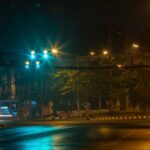- South Korea’s Ministry of Unification confirmed the action, which marks an escalation of tensions between the neighbours
- Earlier this month, two activist groups sent anti-Kim leaflets by balloon across the border, prompting an angry response from North Korea
North Korea blew up an inter-Korean liaison office on its side of the border on Tuesday, the South’s Unification Ministry said, after days of increasingly virulent rhetoric from Pyongyang.
“North Korea blows up Kaesong Liaison Office at 14:49,” the ministry, which handles inter-Korean relations, said in a one-line alert sent to reporters.
The statement came minutes after an explosion was heard and smoke seen rising from the long-shut joint industrial zone in Kaesong where the liaison office was located.
South Korean military camera footage showed flames and smoke engulfing the building before it collapsed.
The destruction of the liaison office came after Kim Yo-jong , the powerful sister of North Korean leader Kim Jong-un , said at the weekend: “Before long, a tragic scene of the useless north-south joint liaison office completely collapsed would be seen.”
The North’s Korean Central News Agency confirmed the liaison office building had been “tragically ruined with a terrific explosion”.
It said the demolition was carried out, “corresponding to the mindset of enraged people to surely force human scum and those, who have sheltered the scum, to pay dearly for their crimes”.
North Korea often describes defectors in the South as “human scum”.
In Seoul, President Moon Jae-in’s top security advisers convened and the country’s military went to a higher level of alert. South Korean Unification Minister Kim Yeon-chul, who was at parliament when the explosion occurred across the border, said the move had been “expected”.
The presidential Blue House said it would respond sternly if North Korea continued to raise tensions.
The destruction of the office “broke the expectations of all people who hope for the development of inter-Korean relations and lasting peace on the peninsula”, deputy national security adviser Kim You-geun told a briefing.
“We’re making clear that the North is entirely responsible for all the consequences this might cause,” he said.
Since early June, North Korea has issued a series of vitriolic condemnations of the South over activists sending anti-Pyongyang leaflets
over the border – something defectors do on a regular basis.
Last week, it announced it was severing all official communication links with South Korea and labelled its neighbour an “enemy”
.
The leaflets – usually attached to hot air balloons or floated in bottles – criticise North Korean leader Kim Jong-un for human rights abuses and his nuclear ambitions.
Park Sang-hak, a leading figure behind the leaflets, refused to comment on the explosion. “I don’t care about the demolition at all. Don’t ask me. Ask the crazy boy Kim Jong-un,” he said.
Analysts say Pyongyang may be seeking to manufacture a crisis to increase pressure on Seoul while nuclear negotiations with Washington are at a standstill.
Earlier on Tuesday, North Korea’s army said it was “fully ready” to take action against the South, including re-entering areas that had been demilitarised under an inter-Korean agreement.
“North Korea is frustrated that the South has failed to offer an alternative plan to revive the US-North talks, let alone create a right atmosphere for the revival,” said Cheong Seong-chang, a director of the Sejong Institute’s Centre for North Korean Studies. “It has concluded the South has failed as a mediator in the process.”
Yoon Sung-suk, a political science professor at Chonnam National University, said the North was trying to punish the South’s President Moon Jae-in for sticking to US-led sanctions despite a 2018 agreement that called for peace, economic prosperity and reunification.
“The North is hitting Moon for his failure to move forward and for sticking to sanctions,” Yoon said.
“The North also needs an easy scapegoat – the South – to deflect attention away from its economic hardship, which has been worsening due to the coronavirus outbreak,” he said. “This is also an indirect message to the US that the North is prepared to go to extremes in sticking to its stance that it won’t disarm itself without sanctions relief.”
Chinese Foreign Ministry spokesman Zhao Lijian told a daily briefing after the incident that the country hoped for peace on the Korean Peninsula. He did not mention the liaison office.
China is North Korea’s main benefactor and trade partner.
The one-month dollar-won non-deliverable forwards rose 0.4 per cent to 1,212.36, implying the local currency will be weaker when onshore markets reopen on Wednesday, Bloomberg reported.
“This probably isn’t enough to derail the broader risk rally today,” said Eddie Cheung, a strategist at Credit Agricole SA in Hong Kong. “But the geopolitical considerations around Korean assets are likely to rise a bit as this marks an active step (and not just a threat) toward cutting ties.”




